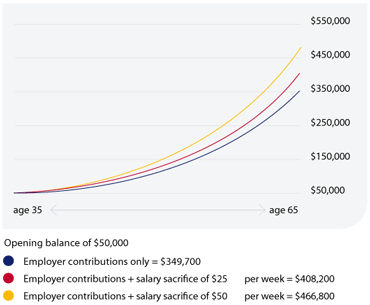Retire
 It is now a critical time to think about wealth management for retirement. It is not too late to put strategies into place for wealth creation.
It is now a critical time to think about wealth management for retirement. It is not too late to put strategies into place for wealth creation.
How much do I need to retire?
Everyone is different, so it’s impossible to say exactly how much money you’ll need for retirement. Some factors to take into account are:
- What age do you plan to retire?
- What sort of lifestyle do you want and how much will it cost?
- Have you paid off all your debts?
- Will you need additional money, for holidays or a car?
A general rule of thumb is that you need approximately 60% of your final pre-retirement salary each year for what could be 20 years or more.
Salary Sacrifice
Salary sacrifice becomes a valuable savings and tax minimisation tool by boosting your super savings whilst reducing your taxable salary and therefore your income tax. If you are planning to voluntarily top up your super, you need to be aware of contribution caps which, once exceeded, may potentially expose you to extra tax. These caps may vary year to year and will continue to change accordingly with government legislation.
Example:

Transition to Retirement
If you’re over 55 and need to build a bigger retirement nest egg without reducing your current income, a transition to retirement strategy could work for you. This involves contributing some of your pre-tax salary into super, while moving some of your existing super into a transition to retirement pension, and drawing a regular income from the pension to replace your reduced salary.
Centrelink
If you are retired or about to retire, make sure your assets are structured in a way to take advantage of Centrelink entitlements. The right arrangements could boost your age pension entitlements or give you access to some age pension you would not otherwise have.
Super vs Mortgage
It used to be widely accepted that the best investment strategy was to pay off your mortgage as quickly as possible. But with government rules making super more tax effective than other investments, the answer is no longer as straightforward. The direction you take depends on factors such as your age, income, level of debt, interest rates and your income tax rate.
Estate Planning
The main reason you need to plan your estate is to make sure your money and assets are inherited by the people you want to receive them. Another important reason is to make sure they attract as little tax as possible. Your Will plays a large part, but other areas to consider are a Power of Attorney, a Testamentary Trust, and a binding nomination under your super.
